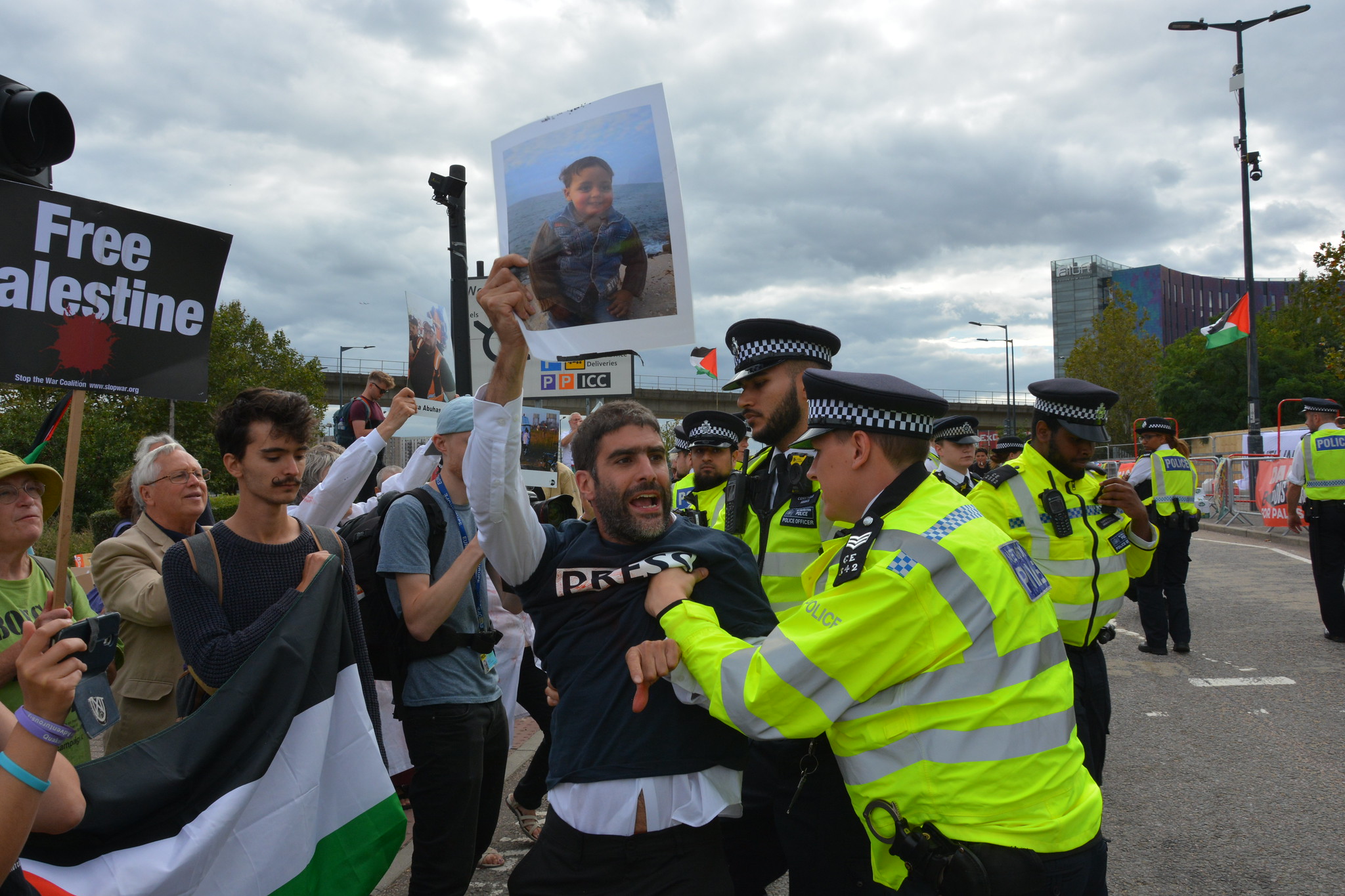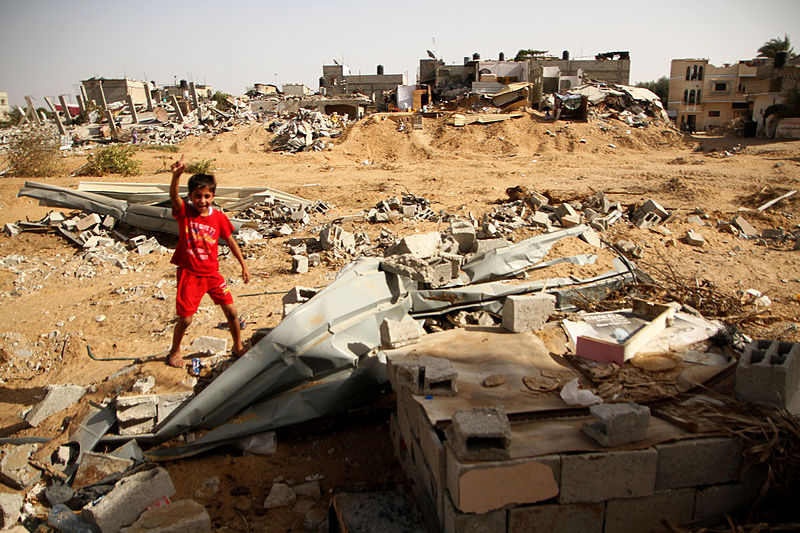Why are CAAT focusing on Israel?
Numerous NGOs and human rights groups, international lawyers and genocide scholars have accused Israel of committing genocide in Gaza, as well as the Lemkin Institute for Genocide Prevention, named after Ralph Lemkin, who first coined the term genocide. Despite this, the UK government continues to supply arms to Israel, in particular components for Israel’s F-35 combat aircraft, one of the planes it is using to bomb Gaza. Simply put, therefore, the UK’s arms trade is currently doing the most harm in Palestine, where Israeli forces continue to wage a genocidal war against a captive population in Gaza, as well as ethnically cleansing the West Bank. There can be no justification for arming any state committing genocide.
Since 2020, the UK has licensed over £257 million worth of arms to Israeli forces through fixed-value licences. The breakdown of the single licences by value includes:
- ML14: Military training equipment – £30m
- ML10: Aircraft and components – £31m
- ML5: Radars, target acquisition, fire control equipment & countermeasures – £146m
- ML11: Other electronic equipment – £12m
- ML4: Grenades, bombs, missiles & components & countermeasures – £9.8m
- ML6: Tanks, armoured vehicles & components – £11m
- ML19: Directed energy weapons – £3.5m
- Other: £14m
In addition, the UK has issued 34 Open Licences in this period, which allow for unlimited exports. Moreover, the UK produces 15% of the value of every US F-35 stealth fighter produced, of which Israel has 45, and has ordered 30 more. This suggests UK arms companies will have made hundreds of millions of pounds from these deliveries already. These sales are not included in the above figures, as UK components for the F-35 are covered by an indefinite, unlimited, Open General Export Licence.
Israeli F-35s took part in the recent attacks on Gaza in a designated ‘safe zone’ in Al-Mawasi in southern Gaza, killing 90 people and injuring at least 300, in July 2024.
Furthermore, this long-standing military support is underpinned by uncritical political support that appears set to deepen in the years ahead, with the UK and Israeli governments focused on establishing a post-Brexit free trade zone. There is no doubt that arms companies will be among the beneficiaries of this relationship, with the two governments having recently signed a military cooperation agreement to strengthen ties.
The biggest of these companies is Elbit Systems, which produces many of the drones used by Israeli forces – including the Hermes drone – and proclaims to provide the “backbone” of the Israeli Defence Forces (IDF). Elbit may be Israeli, but the company and its subsidiaries have offices around the world, including here in the UK. It also enjoys a strong presence in terms of UK contracts, as one of the main contractors for the Ministry of Defence’s Watchkeeper drone programme and provides drones for UK ‘border security’ as part of the government’s campaign to demonise refugees crossing the Channel.
Regardless of how many atrocities have been inflicted, Downing Street has continued to arm and support Israeli forces. UK-made arms have been used against Palestinians before, and it is likely that they will be again and again. These arms sales do not just provide military support–they also send a clear sign of political support for the daily abuse and violence that is central to upholding the occupation.
What is CAAT calling for?
CAAT is calling for a two-way embargo and for the UK to end arms sales and military support for Israeli forces. Since 2020, the UK has licensed over £257 million worth of arms to Israeli forces through fixed-value licences alone, in addition to hundreds of millions of pounds worth of equipment covered by the secretive open licencing system, including components for the F-35.
These terrible air strikes have further added to many years of injustice and bloodshed and now genocide. They must be met with condemnation, and action from the international community, particularly Israel’s allies who wield significant leverage.
Is CAAT being one-sided in our support?
The mainstream media has often framed the current Israeli assault (since October 2023) as a “war”, implying two belligerents in an equal playing field. This is consistent with the narrative that the UK government would have us believe but grossly misrepresents what is happening and what has been happening for over half a century: the Israeli state’s agenda to push indigenous people out of their homes, from land that is already recognised by the UN and the international community as belonging to the Palestinians. The State of Israel’s systematic cultivation of militant extremism, in service of its longstanding practice of ethnically cleansing Palestinian land, has now unsurprisingly reached genocidal levels.
CAAT believes that Israel is committing war crimes and the crime of genocide as part of its ongoing, deliberate and systematic attempt to erase Palestinians from their land, destroy Palestinian culture, and prospects for viable statehood.
Article 49 of the Fourth Geneva Convention states that: “The Occupying Power shall not deport or transfer parts of its own civilian population into the territory it occupies.” It also prohibits the “individual or mass forcible transfers, as well as deportations of protected persons from occupied territory” and therefore, Israel’s policy of settling its civilians in occupied Palestinian territory and displacing the local population contravenes fundamental rules of international humanitarian law.
Israel’s state-led settlement programme includes the demolition of houses, the revocation of Palestinian residency rights as well as forced evictions.
What about Gaza?
The timeline Israel’s genocidal campaign in Gaza since October 2023 has its roots in the occupation of Palestinian land in 1948 and the subsequent abuses of Human Rights, crimes of Apartheid and Persecution by the Israeli state. It is the logical conclusion of a state that has sought to organise the entire area between the Mediterranean Sea and the Jordan River under a single principle: advancing and cementing the supremacy of one group – Jews – over another – Palestinians, according to Israeli human rights organisation B’Tselem.
Today, the Gaza Strip is home to a population of approximately 2.1 million Palestinians, which includes 1.3 million refugees. Blockaded by Israel, this 362 sq/km is one of the most densely populated areas in the world.
Israel maintains control over Gaza’s airspace and territorial waters and prevents the movement of Palestinians and essential goods from entering – including medical equipment, access to food & water as well as building construction equipment – resulting in over 56% of the population languishing in poverty. It is a regime of apartheid, described as such by major Israeli and international human rights organisations, as well as legal scholars.
The Gaza Strip is often linked to Hamas and the Western media’s rhetoric of terrorism, ignoring the daily suffering of a people who are unable to leave, starved and denied internationally recognised human rights solely based on their race or ethnicity.
Why aren’t you calling for an arms embargo on Hamas?
The UK does not supply weapons to Hamas. Our aim is to apply international pressure to ensure that Israeli human rights violations and breaches of international law are brought to an end. Israel is in violation of over 60 UN resolutions, while its Occupation policies violate several articles of the Fourth Geneva Convention and a range of international human rights and humanitarian laws.
It is time for the UK government to signal its unwillingness to accept the crimes of apartheid, genocide and routine war crimes, as well as ensure that UK companies do not profit from the humanitarian crisis that the Palestinians and others are currently experiencing.
Doesn’t Israel have a right to defend itself?
The UN Charter states that every country in the world has a right to defend itself within the bounds of international law and human rights conventions. However, Israel is using military force to maintain a blockade of Gaza and further its occupation of the West Bank that are illegal under international law.
In enforcing this occupation, Israel has consistently used disproportionate force, targeted civilians, used weapons that fail to distinguish between civilians and combatants, and engaged in collective punishment of civilian populations. These are violations of international law and are not covered by the right to self-defence.
Security is not achieved through military force. The only sustainable way to end the violence in Israel and the occupied territories is for Israel to end its blockade of Gaza and its military occupation of the West Bank.
Doesn’t the UK simply sell components of military hardware to Israel?
In today’s globalised arms industry, most major weapons systems are assembled from components sourced from several different countries. For instance, the Apache attack helicopters and its armaments, supplied to Israel by the United States, contain components from the UK, Norway and probably other European countries, as well as the USA.
The F-35, for example, has been integral to Israel’s air assault on Gaza, including in devastating attacks on civilians. As part of its globalised supply chain, 15% (by value) of every F-35 produced is made in the UK. Despite that, The F-35 is almost certainly the single largest and most important part of the UK arms trade with Israel. The value of UK parts in the 45 planes delivered to Israel so far since 2016 is about $540 million, or roughly £430m. This does not include spare parts, which likely amount to around £142m worth since 2016, and around £98m since the start of the current Israeli war on Gaza. When used routinely, as they are by Israel, the huge need for F-35 spare parts to keep them airborne. Between initial production and spares, the estimated value of UK F-35 component supplies to Israel of £572 million represents almost half the total value of UK arms sales to Israel since 2016.
The internationalism of such weapons doesn’t absolve the suppliers of parts from responsibility – a missile or an attack helicopter wouldn’t work without each part contained within it. The UK’s own export control regime recognises this fact: applying the same criteria to the export of components as to complete weapons. In practice, however, laxer standards are applied to the export of components. While the government usually shies away from selling UK-made guns and bombs to Israel, it knowingly licenses the export of their key components.
Israel is a major arms producer and exporter in its own right.
That is why CAAT is calling for a two-way embargo and an end to all military collaboration between the UK and Israel. Such an embargo would send a clear message that Israel’s continued control of the Occupied Palestine Territories, as well as its military actions, are unacceptable to the UK.
You can learn more here: Israel’s Occupation Continues Because Economic and Political Elites Around the World Benefit From It
If we didn’t supply Israel, surely someone else would?
It is no defence in any form of law to claim that someone else would have committed a crime if you hadn’t. It is also an argument for providing any country with arms, no matter how bad their human rights record.
Rather than racing other countries to the bottom in terms of human rights, the UK should be taking a lead in raising the floor upwards by taking its own arms export criteria seriously.
What effect would an embargo really have?
The UK is one of Israel’s closest political friends and economic allies. A signal such as an arms embargo would send a very strong message to Israel to abide by international law.
Moreover, it would mean that UK arms companies are not profiting from the misery of the Palestinians, and that the arms which the UK buys have not been tested on the Palestinians living under Occupation. In other words, the UK is not facilitating or benefiting from Israel’s violations of international law.
Are CAAT anti-Semitic?
CAAT works to stop the UK government exporting weapons to countries where they may exacerbate conflict, support aggression, increase tension and threaten social welfare. We have led campaigns to stop arms sales to the governments and regimes of Saudi Arabia, the USA, Hong Kong, Egypt, Bahrain, Nigeria (to name a few) as well as Israel.
CAAT’s position on the arms trade is agnostic of the state’s religion or ideology. It is the conduct of the state in question that counts, in our eyes, and we stand in solidarity with those being oppressed, and strive to act in solidarity with all those experiencing state-led violence.
What can I do to support?
- If you’re able to do so safely, join your local demonstrations. You can find more details here.
- Follow CAAT, War On Want, Palestine Solidarity Campaign and others on Twitter for other actions you can take in the coming days.
- Read and share our press release to raise awareness of the shocking scale of the UK arms trade with Israel and call on the UK government to end these sales: CAAT calls for investigation into if UK arms have been used in bombing of Gaza, CAAT call for UK to end arms sales and military support for Israeli forces
- Share our social media post on Twitter and Facebook to show your solidarity with Palestinians
- Join CAAT in taking on the power and influence of the arms trade? If you haven’t already, please sign up for email updates from CAAT and we’ll send you all the latest anti-arms trade news and campaign actions. You can also follow us on Facebook, Twitter and Instagram.
- And, if you’re able, please do donate towards our work.
Recommended Resources
B’Tselem – Our Genocide
Amnesty International – Understanding the long roots of violence in the Occupied Palestinian Territories and Israel
Airwars – Patterns of Harm Analysis
Al-Haq – Genocide Legal Brief Series
Visualizing Palestine – Jerusalem: A City For All?



